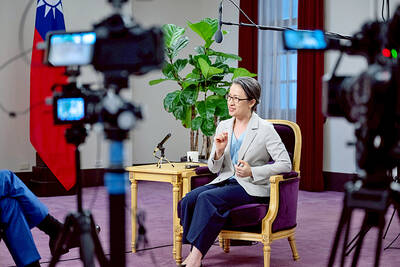Taiwanese gangster film Monga (艋舺) featured the most smoking scenes among popular movies released from 2008 to last year, followed by US supernatural action film Constantine, a study released by the Health Promotion Administration (HPA) yesterday showed.
The agency’s smoking scene monitor program found that Monga topped the list with 120 scenes with smokers, followed by Constantine with 110, US film adaptation of the novel of the same title Memoirs of a Geisha with 109, Singaporean dark comedy Ah Long Pte Ltd with 108 and Chinese biographical film Mei Lanfang (梅蘭芳) with 102.
Rounding out the top 10 were Hong Kong comedy Kung Fu Hustle (功夫) with 101 scenes, Hong Kong gangster film Triad (紮職) with 101, US musical Nine with 99 and Hong Kong’s King of Comedy (喜劇之王) with 83.
“In addition, about 36 percent of the movies aired in the past four years contained smoking scenes,” agency Director-General Chiou Shu-ti (邱淑媞) told a news conference in Taipei yesterday.
A larger concern is that more than 90 percent of the films were rated G, PG or PG-13, putting young viewers at risk of being swayed by the scenes, Chiou said.
During the agency’s monitoring of movies over the past six years, about 57 percent of films in Mandarin contained smoking scenes, compared with 37 percent of foreign-language movies, Chiou said.
“Moreover, the average number of smoking scenes in the former is 21.4, higher than the 18.89 scenes in the latter. Smoking scenes average an estimated five minutes in a 100-minute-long Mandarin-language movie,” she said.
Chiou said research showed that as much as 52 percent of people who started smoking during adolescence did so because of their exposure to smoking early in life.
The agency advised parents to discuss the health risks of cigarettes with their children when coming across such scenes in movies to deter them from using tobacco at an early age.

China might accelerate its strategic actions toward Taiwan, the South China Sea and across the first island chain, after the US officially entered a military conflict with Iran, as Beijing would perceive Washington as incapable of fighting a two-front war, a military expert said yesterday. The US’ ongoing conflict with Iran is not merely an act of retaliation or a “delaying tactic,” but a strategic military campaign aimed at dismantling Tehran’s nuclear capabilities and reshaping the regional order in the Middle East, said National Defense University distinguished adjunct lecturer Holmes Liao (廖宏祥), former McDonnell Douglas Aerospace representative in Taiwan. If

TO BE APPEALED: The environment ministry said coal reduction goals had to be reached within two months, which was against the principle of legitimate expectation The Taipei High Administrative Court on Thursday ruled in favor of the Taichung Environmental Protection Bureau in its administrative litigation against the Ministry of Environment for the rescission of a NT$18 million fine (US$609,570) imposed by the bureau on the Taichung Power Plant in 2019 for alleged excess coal power generation. The bureau in November 2019 revised what it said was a “slip of the pen” in the text of the operating permit granted to the plant — which is run by Taiwan Power Co (Taipower) — in October 2017. The permit originally read: “reduce coal use by 40 percent from Jan.

‘SPEY’ REACTION: Beijing said its Eastern Theater Command ‘organized troops to monitor and guard the entire process’ of a Taiwan Strait transit China sent 74 warplanes toward Taiwan between late Thursday and early yesterday, 61 of which crossed the median line in the Taiwan Strait. It was not clear why so many planes were scrambled, said the Ministry of National Defense, which tabulated the flights. The aircraft were sent in two separate tranches, the ministry said. The Ministry of Foreign Affairs on Thursday “confirmed and welcomed” a transit by the British Royal Navy’s HMS Spey, a River-class offshore patrol vessel, through the Taiwan Strait a day earlier. The ship’s transit “once again [reaffirmed the Strait’s] status as international waters,” the foreign ministry said. “Such transits by

Taiwan is doing everything it can to prevent a military conflict with China, including building up asymmetric defense capabilities and fortifying public resilience, Vice President Hsiao Bi-khim (蕭美琴) said in a recent interview. “Everything we are doing is to prevent a conflict from happening, whether it is 2027 or before that or beyond that,” Hsiao told American podcaster Shawn Ryan of the Shawn Ryan Show. She was referring to a timeline cited by several US military and intelligence officials, who said Chinese President Xi Jinping (習近平) had instructed the Chinese People’s Liberation Army to be ready to take military action against Taiwan